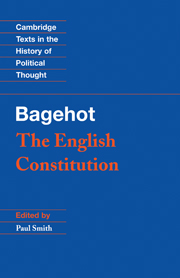Book contents
- Frontmatter
- Contents
- Editor's introduction
- Principal events in Bagehot's life
- Note on the text and annotation
- The English Constitution
- I The Cabinet
- II The Prerequisites of Cabinet Government, and the Peculiar Form Which They Have Assumed in England
- III The Monarchy
- IV The Monarchy (continued)
- V The House of Lords
- VI The House of Commons
- VII On Changes of Ministry
- VIII Its Supposed Checks and Balances
- IX Its History, and the Effects of That History – Conclusion
- Introduction to the Second Edition (1872)
- Biographical notes on persons mentioned in the text
- Bibliographical note
- Index
- Title in the series
IX - Its History, and the Effects of That History – Conclusion
Published online by Cambridge University Press: 05 June 2012
- Frontmatter
- Contents
- Editor's introduction
- Principal events in Bagehot's life
- Note on the text and annotation
- The English Constitution
- I The Cabinet
- II The Prerequisites of Cabinet Government, and the Peculiar Form Which They Have Assumed in England
- III The Monarchy
- IV The Monarchy (continued)
- V The House of Lords
- VI The House of Commons
- VII On Changes of Ministry
- VIII Its Supposed Checks and Balances
- IX Its History, and the Effects of That History – Conclusion
- Introduction to the Second Edition (1872)
- Biographical notes on persons mentioned in the text
- Bibliographical note
- Index
- Title in the series
Summary
A volume might seem wanted to say anything worth saying on the history of the English Constitution, and a great and new volume might still be written on it, if a competent writer took it in hand. The subject has never been treated by any one combining the lights of the newest research and the lights of the most matured philosophy. Since the masterly book of Hallam was written, both political thought and historical knowledge have gained much, and we might have a treatise applying our strengthened calculus to our augmented facts. I do not pretend that I could write such a book, but there are a few salient particulars which may be fitly brought together, both because of their past interest and of their present importance.
There is a certain common polity, or germ of polity, which we find in all the rude nations that have attained civilisation. These nations seem to begin in what I may call a consultative and tentative absolutism. The king of early days, in vigorous nations, was not absolute as despots now are; there was then no standing army to repress rebellion, no organised espionage to spy out discontent, no skilled bureaucracy to smooth the ruts of obedient life. The early king was indeed consecrated by a religious sanction; he was essentially a man apart, a man above others, divinely anointed, or even God-begotten.
- Type
- Chapter
- Information
- Bagehot: The English Constitution , pp. 171 - 192Publisher: Cambridge University PressPrint publication year: 2001



